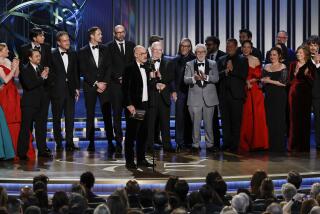Review: How Aaron Sorkin gets ‘Newsroom’ right...just as it’s ending
Premiering three years ago, when the TV-renaissance bacchanal had reached fever pitch, “The Newsroom” was greeted with giddy anticipation — Aaron Sorkin on HBO!
It was followed by an often weirdly personal disappointment when the series failed to amaze. How could this happen? In the “Golden Age of Television”?
Sorkin, never one to shy away from controversy, engaged in the kind of public dialogue that a decade or so ago —- when most people thought television was written by, you know, the actors — would have been unheard of. The second season seemed to respond to many of the criticisms, albeit in a way that did not, for good or ill depending on your point of view, shift the essential nature of the show.
Early episodes of the third season, which premieres Sunday, continue this trend. And though “best season ever” has become boilerplate, these six episodes of “The Newsroom” promise to be just that. A still pointed but more controlled take on the crossroads of media and culture, “The Newsroom” is now much closer to the show that many hoped it would be.
Just in time for it to end.
A bit maddening, yes, but also quite significant. As the tag line for this season indicates: “Every story needs a final word,” a phrase that can be read several ways.
News anchors like Jeff Daniels’ Will McAvoy rarely leave the air without a farewell address, and Sorkin himself has, to a certain extent, built a career on final words.
As with many series on HBO, the evolution of “The Newsroom” has been at least as interesting to watch as the show itself. The premium cable network has long been the Paris runway of television, where experiments in form, voice and content, whether hits or flops, almost always have a deep and lasting impact on whatever television does next.
“The Newsroom” is no exception.
In a larger sense, however, both this season and its tag line speak to one of the most substantial shifts in television: Endings matter. Maybe not as much as beginnings, but almost.
They didn’t used to. Even on premium cable, most television series were, by their very nature, open-ended, their life spans dictated much more by popularity and economics than narrative intent.
Shows with low ratings were killed abruptly, mid-storyline, while the best series ran ‘til the wheels started falling off. Those finales were often hyped, usually emotional and almost always a relief.
Some of us may still miss “MASH” but probably not its final seasons when Hot Lips and Hawkeye were friends, Klinger had given up on his Section 8 and the show had run almost four times longer than the actual Korean War.
Now the creators and purveyors of television think in increasingly finite terms. How many seasons are needed to tell this particular story? How long can this conceit be reasonably sustained before it starts to fade?
Even when a series is killed sooner than, perhaps, the creator had expected, every attempt is made to break the news early, assemble friends for closure and then go out with a bang.
In a world where series regularly now have two finales (one mid-season, one at the end), final seasons have become such an event that Hallmark may need a new subset in the condolence/aspirational thoughts section: We the fans of (“Parenthood/”/”How I Met Your Mother”/”Mad Men”) will meet these last challenging weeks together.
And so we reunite with an ACN newsroom in which the news, both national and internal, is taken seriously and every player granted a level of professionalism, though not, mercifully, personal perfection. Except Sam Waterston’s Charlie Skinner, who remains perfect in every way.
Will (Daniels) and his producer MacKenzie McHale (Emily Mortimer) are still getting married, and while this may pose some serious HR questions, their relationship has grown refreshingly mature, both personally and professionally. A scene of wedding plans is almost instantly cut short by the bombing at the Boston Marathon, which allows Will and his ACN staff a chance to reclaim the reputation it lost during the Genoa debacle last season. It also provides Sorkin the opportunity to praise the old media ways over the new (Twitter and BuzzFeed take big hits).
The point is not belabored, however, and the story then goes more fictional with both business anchor Sloan (Olivia Munn) and in-house blogger Neal (Dev Patel) breaking potential big news: a takeover of ACN’s parent company and the receipt of damning classified documents, respectively.
Converging in last-stand between economic reality and journalistic responsibility, the uber plot allows a chance for the entire cast of characters to work out their various personal crises — Alison Pill’s beleaguered young producer is immediately given several moments to shine — and their relationships. Marcia Gay Harden is back, always a good sign, as ACN’s in-house counsel, as is Chris Messina’s Reese, the parent-company president now on the side of the angels.
But it’s Will’s show, as Daniels’ first season Emmy proved, and, to a lesser extent, Mack’s. And having been relieved of their more absurd initial characteristics — it wasn’t until the second season that even the gifted Mortimer could make us believe Mack was an actual producer, much less a great one — they are much calmer and more complicated.
Enough so that the choices they and, by extension, Sorkin make will mean something, possibly something interesting and important.
So say what you will about Sorkin, and many people have, but he understands television. Where now the second-most-important directive is: Finish big.
Follow me on Twitter @marymacTV
---------------------------------------------
‘The Newsroom’
Where: HBO
When: 9 p.m. Sunday
Rating: TV-MA (may be unsuitable for children under the age of 17)
More to Read
The complete guide to home viewing
Get Screen Gab for everything about the TV shows and streaming movies everyone’s talking about.
You may occasionally receive promotional content from the Los Angeles Times.







